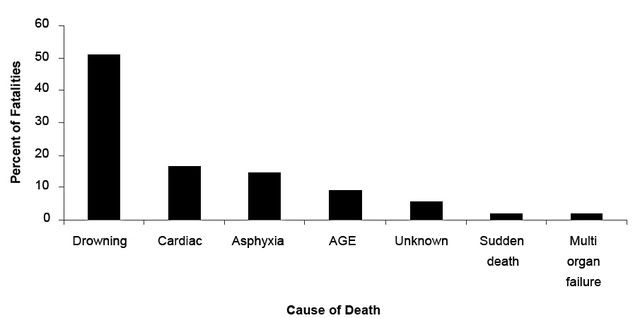- Messages
- 54,485
- Reaction score
- 8,584
- # of dives
- 500 - 999
Good for you to ask. I don't think many do; I didn't until I heard a first hand description of the Roatan compressor that killed a Texas tourist and popular, local DM two years ago. Even then, it took me a while to build up to this - not realizing how wide spread the risk is. I've taken the rest of your post out to try to answer in parts...In Belize I wondered about the condition of some of the compressors. When I asked about it...
the dive masters (who, despite living in a developing country are neither stupid nor uneducated) told me that their compressors regularly checked by PADI. They're supposed send air samples into TA or another qualified lab quarterly and maintain records, but there is no enforcement. I have to wonder about the truthfulness in them actually knowing or just repeating what they heard? Even if a resort had a monitor alarm that the compressor was putting out 12 ppm CO; the show must go on, the resort guests must dive, and the DM has to feed his family at the end of the day - so how much rationalizing could happen?
BTW, I have only been to Belize tonce, dived with two operators, didn't know about this problem then: one operator there did show me his compressor and records tho and has posted here recently that he still tests and records, but doesn't bother telling Padi; the other - I would never think about diving with again.
Not only that, but the dive masters themselves, who use those those compressors daily, have a very good incentive to ensure they are maintained properly. In other words, in many cases the guy who maintains the compressor is also the guy who breathes the most air from it. Well, yes - as was the case for the Roatan DM killed in 2006, the Maldives DM severely injured recently as discussed in this thread http://www.scubaboard.com/forums/ac...ed-baani-adventurer-maldives-liveaboards.html and so on. I really don't think that many of those DMs would go on strike if the testing wasn't done and the compressors weren't kept spotless.
Having said that, judging from the outward appearance of some of these compressors, anyone would question the air quality. You did look at some? What did you see? If you saw any oil leaks, congratulations for being alive.
I wonder:
1. What does DAN say about this? As I mentioned in post #1: Excerpted from Alert Diver Article: CO Monitors - a carbon monoxide detector can save your life May / June 1998 Issue, By: Robert N. Rossier
Most states and municipalities do not require testing of a diver's air in the event of a fatality. The autopsy findings of a drowning victim are non-specific, and the presumed cause of death is often based on circumstantial evidence. Routine toxicological studies performed at autopsy do not include a measure of CO blood or tissue levels. Unless CO poisoning is suspected, usually no tests are made to determine levels in the body or the amount in the diver's breathing-gas cylinder. These facts point to the question of how many other diving fatalities might actually involve CO poisoning as a contributing factor.
DAN members may login to see the entire article here: Divers Alert Network : Alert Diver Articles
If you'd drowned in Belize, it's just not likely that you or the tank air would be checked, and even if they were and CO found - like the Roatan case, you'd never read about it. Tourism cannot be discouraged.
2. How come there isn't a purpose-built SCUBA tank CO detector? Sometimes the trash bag that I always carry around with me gets a hole in it. I suppose because the market pressure is always about cutting prices reasonably, so Padi passed the buck by requiring Padi operators to test their compressor air and keep records - no enforcement, no requirement to use an inline monitor with auto shut-off, nothing else I know of, and I have been looking, reading, discussing, whining, even calling Padi. I suppose I may have missed something, but then - maybe not.
Looking over the most recent 2007 DAN Diving Report on 2005 injuries and deaths https://www.diversalertnetwork.org/medical/report/index.asp , of the 89 US & Canadian citizens whose deaths were reported to DAN, most of those died in US & Canadian waters. But looking at the cause of death for all reported everywhere, over 50% drowned, some unknown, some written off as Sudden Death, and even of the Cardiac cases - who knows. No one knows how many died with CO being the root cause, much less how many cases of "vacation flu" and "travelers illness" may have been caused by this largely unmonitored risk.
Okay, there is certainly a chance that I may be over estimating the risk. Even tho many (most) tropical operators do not test and do not run CO monitors with auto shut off, maybe the end result is still a low numbers of deaths and injuries as the compressor operators probably do a good job. Well, that's not enough for me to feel comfortable at depth, so I will be double checking my air for CO just like I double check my Nitrox for O2.







